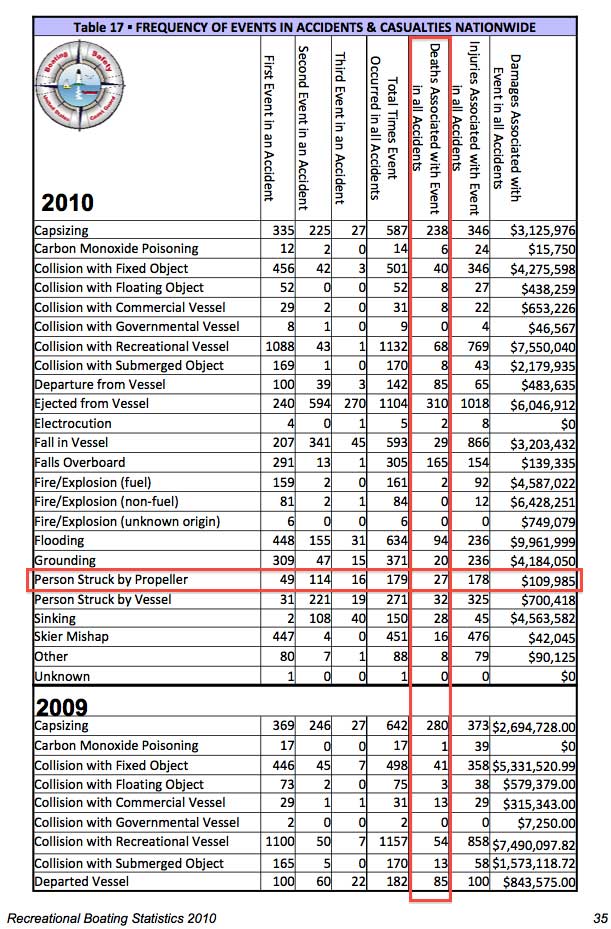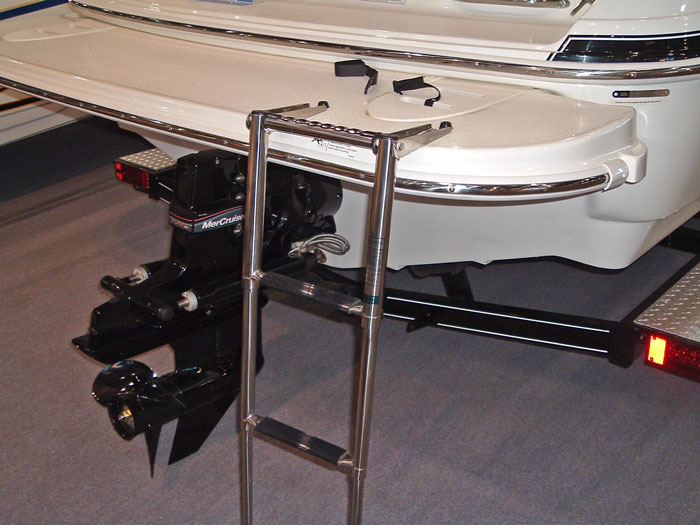Shark Attacks vs. Propeller Strikes: A Statistical Comparison
We often see media reports referring to propeller strikes as very rare or freak events, while shark attacks are trumpeted as an ever present danger. While both events share some potentially horrible outcomes and spark fear in victims and onlookers, propeller accidents are actually much more frequent.
This post is being written in response to a column in the Newport Beach Independent over the weekend: Surprise! Proposed Boating Regulation Would Make Things Worse. Newport Beach Independent. September 9, 2011.
In his column, Roger Bloom discusses the recent U.S. Coast Guard Advanced Notice of Proposed Rulemaking (ANPRM) pertaining to shutting the engines down when swimmers are near the rear of the vessel to prevent propeller strikes and carbon monoxide poisoning. Mr. Bloom feels the proposed rule would cause more problems that it would solve. While we do not agree with several of his statements, we were shocked to find him stating that shark attacks are more prevalent that propeller strikes.
The ANPRM is based on no science and a knee-jerk reaction to an infrequent type of boating accident from propeller strikes and carbon monoxide casualties. I do not want to downplay the seriousness of being hit by a propeller, but this is a rare occurrence in the boating world – more people are bitten by sharks.
The U.S. Coast Guard (USCG) 2010 Boating Statistics report which was previously discussed in his column reports 179 USCG reported recreational boat propeller accidents in the United States in 2010 (on page 35 of their annual report) in which a total of 27 people died.
The International Shark Attack File, maintained by the Florida Museum of Natural History at the University of Florida maintains a widely known database of shark attacks. They report a total of 36 shark attacks in the United States in 2010 of which 2 were fatal, per their ISAF Shark Statistics for the USA Locations with the Highest Shark Attack Activity Since 2000 page. Another page on their site shows only 79 shark attacks in the whole world in 2010 (less than half the number of U.S. propeller strikes per USCG). Wikipedia also provides similar annual shark attack statistics.
Shark attacks are sensational news. As a result, in our opinion, a specific shark attack is far more likely to be reported by the media and picked up by the shark attack database than a specific propeller accident is likely to be reported to USCG. Therefore, we anticipate the ratio of propeller accidents to shark attacks to be in considerably in excess of the 179/36 calculated from the two databases. In addition, USCG excludes many reported propeller accidents that do not meet their specific criteria (see Non-Reportable accidents on pages 11 and 12 of USCGs 2010 annual boating statistics report). In addition, some propeller accidents are misclassified as other types of accidents in USCG’s BARD (Boating Accident Report Database).
The leading databases for propeller strikes and shark attacks in the U.S. indicate there were 179 recreational boat propeller accidents vs. 36 shark attacks in 2010. There were almost 5 times as many propeller strikes as shark attacks.
We attempted to post a note similar to this one on the Newport Beach Independent in the comments section of the column and called for them to correct the article, however their system would not accept our comments, so we responded here instead.
We do salute Mr. Bloom’s efforts to encourage boaters to respond to the Advanced Notice of Proposed Rulemaking. We join with him in encouraging everybody respond to the ANPRM. Just go to regulations.gov and enter USCG-2011-0497 in the “Enter Keyword or ID” search box to view the proposed rule and to submit your comments.
We still encourage Newport Beach Independent to correct their statement claiming shark attacks were more prevalent so their readers do not continue to be misled.



How trivial who cares! The proposed regulation is just another burden on boaters from the nanny nation.
In response to WILLIAM (09.14.11):
You have to have been there. The 10 year old boy, a fine soccer player in his school, falls off the swim platform of his family’s skiboat and is sucked into the reverse-driven propeller of the backing boat. It will be touch and go as to his survival; blood everywhere, near complete amputation of the lower limb at the knee. He will survive with rapid and technically-accurate care. But he will lose his limb well above the knee. And he is your “bud”….really close friend with whom you “used to” play soccer. As you visit him in the hospital, you wonder if this could have been prevented. He could have been more careful? Absolutely. Still… to be careful is not something young boys take seriously. How about a prop guard around a turning propeller of a boat operating at slow speed among a group of people? I read that prop guards have been technically available for 50 years! Why aren’t they available with production models of recreational ski boats? And then, William, you will get mad! But for a prop guard, you could be playing soccer with your bud tomorrow! Then YOU WILL care! Not so trivial a matter anymore. Ah, the proposed regulation might not seem so burdensome, eh? You could still be running around with your pal….which you won’t be doing anymore. Think about that.